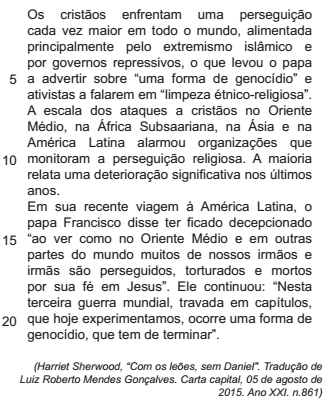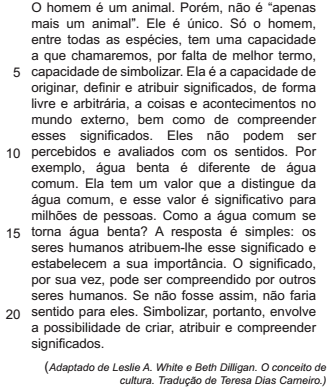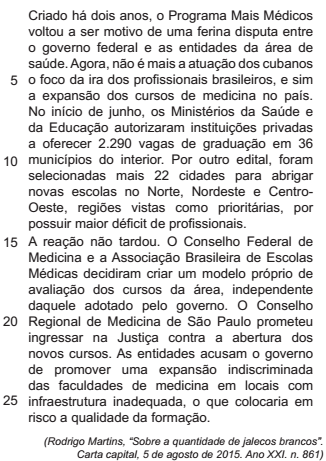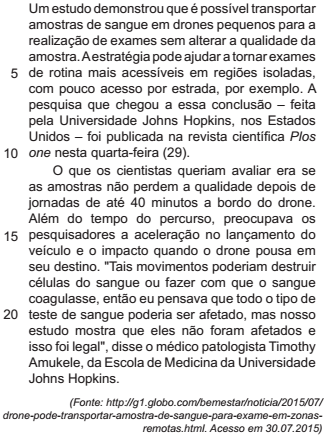Questões de Concurso
Comentadas para esaf
Foram encontradas 4.260 questões
Resolva questões gratuitamente!
Junte-se a mais de 4 milhões de concurseiros!
I- O emprego da técnica legislativa das cláusulas abertas ou conceitos jurídicos indeterminados, como ordem pública, interesse social e boa-fé.
II- A normatividade dos princípios, normas que não são descritivas de condutas específicas, mas que consagram determinados valores ou indicam fins públicos a serem realizados por diferentes meios, como dignidade da pessoa humana, justiça, solidariedade, eficiência.
III- O reconhecimento da existência de colisões de normas constitucionais, de princípios ou de direitos fundamentais como fenômenos inerentes e inevitáveis dentro de um Estado democrático de direito, baseado no pluralismo político.
IV- Legitimação das decisões de acordo com os fundamentos da teoria da argumentação, voltada à demonstração racional de que a solução produzida foi a mais adequada do ponto de vista constitucional.
Estão corretos apenas os itens:
Text 3
Small, cold, and absurdly far away, Pluto has
always been selfi sh with its secrets.
THE X – FILES
It wouldn´t be the fi rst time Pluto has confounded expectations. In 2006, the year New Horizons was launched, Pluto vanished from the list of planets and reappeared as a “dwarf planet.” That, of course, had more to do with astronomers on Earth than any celestial sleight of hand, but the truth is, Pluto has been a tough world to crack since before it was discovered.
By the turn of the century, the hunt for that missing planet had gathered momentum: Whoever found it would earn the shiny distinction of discovering the first new planet in more than 50 years. Calling the rogue world “Planet X,”, Boston aristocrat Percival Lowell – perhaps best known for claiming to have spotted irrigation canals on the surface of Mars – vigorously took up the search. Lowell had built his own observatory in Flagstaff, Arizona, and in 1905 it became the epicenter of the search for Planet X, with Lowell calculating and recalculating its probable position and borrowing equipment for the hunt.
But Lowell died in 1916, without knowing that Planet X really existed.
Fast-forward to 1930. Late one February afternoon, 24-year-old Clyde Tombaugh was parked in his spot at Lowell Observatory. A transplant from the farm fields of Kansas, Tombaugh had been assigned the task of searching for Lowell`s elusive planet. He had no formal training in astronomy but had developed a skill for building telescopes, sometimes from old car parts and other improbable items.
(Source: National Geographic Magazine – July 2015 - http://
ngm.nationalgeographic.com/ print/2015/07/ pluto/drake-text
(adapted))
Text 3
Small, cold, and absurdly far away, Pluto has
always been selfi sh with its secrets.
THE X – FILES
It wouldn´t be the fi rst time Pluto has confounded expectations. In 2006, the year New Horizons was launched, Pluto vanished from the list of planets and reappeared as a “dwarf planet.” That, of course, had more to do with astronomers on Earth than any celestial sleight of hand, but the truth is, Pluto has been a tough world to crack since before it was discovered.
By the turn of the century, the hunt for that missing planet had gathered momentum: Whoever found it would earn the shiny distinction of discovering the first new planet in more than 50 years. Calling the rogue world “Planet X,”, Boston aristocrat Percival Lowell – perhaps best known for claiming to have spotted irrigation canals on the surface of Mars – vigorously took up the search. Lowell had built his own observatory in Flagstaff, Arizona, and in 1905 it became the epicenter of the search for Planet X, with Lowell calculating and recalculating its probable position and borrowing equipment for the hunt.
But Lowell died in 1916, without knowing that Planet X really existed.
Fast-forward to 1930. Late one February afternoon, 24-year-old Clyde Tombaugh was parked in his spot at Lowell Observatory. A transplant from the farm fields of Kansas, Tombaugh had been assigned the task of searching for Lowell`s elusive planet. He had no formal training in astronomy but had developed a skill for building telescopes, sometimes from old car parts and other improbable items.
(Source: National Geographic Magazine – July 2015 - http://
ngm.nationalgeographic.com/ print/2015/07/ pluto/drake-text
(adapted))
Text 3
Small, cold, and absurdly far away, Pluto has
always been selfi sh with its secrets.
THE X – FILES
It wouldn´t be the fi rst time Pluto has confounded expectations. In 2006, the year New Horizons was launched, Pluto vanished from the list of planets and reappeared as a “dwarf planet.” That, of course, had more to do with astronomers on Earth than any celestial sleight of hand, but the truth is, Pluto has been a tough world to crack since before it was discovered.
By the turn of the century, the hunt for that missing planet had gathered momentum: Whoever found it would earn the shiny distinction of discovering the first new planet in more than 50 years. Calling the rogue world “Planet X,”, Boston aristocrat Percival Lowell – perhaps best known for claiming to have spotted irrigation canals on the surface of Mars – vigorously took up the search. Lowell had built his own observatory in Flagstaff, Arizona, and in 1905 it became the epicenter of the search for Planet X, with Lowell calculating and recalculating its probable position and borrowing equipment for the hunt.
But Lowell died in 1916, without knowing that Planet X really existed.
Fast-forward to 1930. Late one February afternoon, 24-year-old Clyde Tombaugh was parked in his spot at Lowell Observatory. A transplant from the farm fields of Kansas, Tombaugh had been assigned the task of searching for Lowell`s elusive planet. He had no formal training in astronomy but had developed a skill for building telescopes, sometimes from old car parts and other improbable items.
(Source: National Geographic Magazine – July 2015 - http://
ngm.nationalgeographic.com/ print/2015/07/ pluto/drake-text
(adapted))
Text 2
Read text 2 and chose the best answer to questions 25 to 27 below:
The United Nations`s (UN`s) Third International
Conference on Financing for Development in Addis Ababa
The Addis Ababa Conference brings together governments, businesses and civil society to mobilize the resources needed to implement the UN`s Sustainable Development Goals (SDGs - the foundation of the post- 2015 development agenda) and a new global climate agreement, both of which are due later this year. The Addis Conference is an opportunity for policymakers to turn rhetoric into action, by agreeing on the funding and fi nancial tools that can put the SDGs within reach.
The good news is that many of the solutions, technologies, and skills needed to achieve these global goals already exist. One important factor is the transition from cash to digital payments. There is growing evidence that digitizing payments boosts transactional effi ciency, reduces costs, improves transparency and accountability, unlocks domestic resources, and drives fi nancial inclusion in the places that need it most.
In Mexico, the government trimmed its spending on wages, pensions, and social welfare by 3.3% annually, or nearly US$1.3bn, by centralizing and digitizing its payments;
In India, a McKinsey study estimates savings for the government of over US$22bn annually through automated payments that help reduce transaction costs and fraud.
Not only can digital payments deliver major cost savings in straightened fiscal times, they also offer governments a rare boost on the revenue side of national ledgers. By bringing more people and businesses into the formal economy, digital payments can vastly expand a country`s tax base, providing new funds to invest in the drivers of productivity and growth.
The financial exclusion of so many people and businesses – all potential sources of economic growth – makes no sense, particularly at a time when growth is now slowing in much of the developing world. Figures like these also demonstrate why drafts on the Addis Accord prepared in advance of the conference repeatedly call for greater financial inclusion, including for women and SME (Small and Medium Sized Enterprises).
The Economist (Source: http://www.economistinsights.com/
technologyinnovation/opinion/cashing-out
- adapted)
Text 2
Read text 2 and chose the best answer to questions 25 to 27 below:
The United Nations`s (UN`s) Third International
Conference on Financing for Development in Addis Ababa
The Addis Ababa Conference brings together governments, businesses and civil society to mobilize the resources needed to implement the UN`s Sustainable Development Goals (SDGs - the foundation of the post- 2015 development agenda) and a new global climate agreement, both of which are due later this year. The Addis Conference is an opportunity for policymakers to turn rhetoric into action, by agreeing on the funding and fi nancial tools that can put the SDGs within reach.
The good news is that many of the solutions, technologies, and skills needed to achieve these global goals already exist. One important factor is the transition from cash to digital payments. There is growing evidence that digitizing payments boosts transactional effi ciency, reduces costs, improves transparency and accountability, unlocks domestic resources, and drives fi nancial inclusion in the places that need it most.
In Mexico, the government trimmed its spending on wages, pensions, and social welfare by 3.3% annually, or nearly US$1.3bn, by centralizing and digitizing its payments;
In India, a McKinsey study estimates savings for the government of over US$22bn annually through automated payments that help reduce transaction costs and fraud.
Not only can digital payments deliver major cost savings in straightened fiscal times, they also offer governments a rare boost on the revenue side of national ledgers. By bringing more people and businesses into the formal economy, digital payments can vastly expand a country`s tax base, providing new funds to invest in the drivers of productivity and growth.
The financial exclusion of so many people and businesses – all potential sources of economic growth – makes no sense, particularly at a time when growth is now slowing in much of the developing world. Figures like these also demonstrate why drafts on the Addis Accord prepared in advance of the conference repeatedly call for greater financial inclusion, including for women and SME (Small and Medium Sized Enterprises).
The Economist (Source: http://www.economistinsights.com/
technologyinnovation/opinion/cashing-out
- adapted)
Text 2
Read text 2 and chose the best answer to questions 25 to 27 below:
The United Nations`s (UN`s) Third International
Conference on Financing for Development in Addis Ababa
The Addis Ababa Conference brings together governments, businesses and civil society to mobilize the resources needed to implement the UN`s Sustainable Development Goals (SDGs - the foundation of the post- 2015 development agenda) and a new global climate agreement, both of which are due later this year. The Addis Conference is an opportunity for policymakers to turn rhetoric into action, by agreeing on the funding and fi nancial tools that can put the SDGs within reach.
The good news is that many of the solutions, technologies, and skills needed to achieve these global goals already exist. One important factor is the transition from cash to digital payments. There is growing evidence that digitizing payments boosts transactional effi ciency, reduces costs, improves transparency and accountability, unlocks domestic resources, and drives fi nancial inclusion in the places that need it most.
In Mexico, the government trimmed its spending on wages, pensions, and social welfare by 3.3% annually, or nearly US$1.3bn, by centralizing and digitizing its payments;
In India, a McKinsey study estimates savings for the government of over US$22bn annually through automated payments that help reduce transaction costs and fraud.
Not only can digital payments deliver major cost savings in straightened fiscal times, they also offer governments a rare boost on the revenue side of national ledgers. By bringing more people and businesses into the formal economy, digital payments can vastly expand a country`s tax base, providing new funds to invest in the drivers of productivity and growth.
The financial exclusion of so many people and businesses – all potential sources of economic growth – makes no sense, particularly at a time when growth is now slowing in much of the developing world. Figures like these also demonstrate why drafts on the Addis Accord prepared in advance of the conference repeatedly call for greater financial inclusion, including for women and SME (Small and Medium Sized Enterprises).
The Economist (Source: http://www.economistinsights.com/
technologyinnovation/opinion/cashing-out
- adapted)
Text 1
The good oil boys club
It should have been a day of high excitement. A public auction on July 15th marked the end of a 77-year monopoly on oil exploration and production by Pemex, Mexico`s state-owned oil company, and ushered in a new era of foreign investment in Mexican oil that until a few years ago was considered unimaginable.
The Mexican government had hoped that its firstever auction of shallow-water exploration blocks in the Gulf of Mexico would successfully launch the modernisation of its energy industry. In the run-up to the bidding, Mexico had sought to be as accommodating as its historic dislike for foreign oil companies allowed it to be. Juan Carlos Zepeda, head of the National Hydrocarbons Commission, the regulator, had put a premium on transparency, saying there was “zero room” for favouritism.
When prices of Mexican crude were above $100 a barrel last year (now they are around $50), the government had spoken optimistically of a bonanza. It had predicted that four to six blocks would be sold, based on international norms.
It did not turn out that way. The results fell well short of the government’s hopes and underscore how residual resource nationalism continues to plague the Latin American oil industry. Only two of 14 exploration blocks were awarded, both going to the same Mexican-led trio of energy fi rms. Offi cials blamed the disappointing outcome on the sagging international oil market, but their own insecurity about appearing to sell the country’s oil too cheap may also have been to blame, according to industry experts. On the day of the auction, the fi nance ministry set minimum-bid requirements that some considered onerously high; bids for four blocks were disqualifi ed because they failed to reach the offi cial fl oor.
(Source: http://www.economist.com/news/business/21657827-
latinamericas-oil-fi
rms-need-more-foreign-capital-historic-auctionmexico-shows)
Text 1
The good oil boys club
It should have been a day of high excitement. A public auction on July 15th marked the end of a 77-year monopoly on oil exploration and production by Pemex, Mexico`s state-owned oil company, and ushered in a new era of foreign investment in Mexican oil that until a few years ago was considered unimaginable.
The Mexican government had hoped that its firstever auction of shallow-water exploration blocks in the Gulf of Mexico would successfully launch the modernisation of its energy industry. In the run-up to the bidding, Mexico had sought to be as accommodating as its historic dislike for foreign oil companies allowed it to be. Juan Carlos Zepeda, head of the National Hydrocarbons Commission, the regulator, had put a premium on transparency, saying there was “zero room” for favouritism.
When prices of Mexican crude were above $100 a barrel last year (now they are around $50), the government had spoken optimistically of a bonanza. It had predicted that four to six blocks would be sold, based on international norms.
It did not turn out that way. The results fell well short of the government’s hopes and underscore how residual resource nationalism continues to plague the Latin American oil industry. Only two of 14 exploration blocks were awarded, both going to the same Mexican-led trio of energy fi rms. Offi cials blamed the disappointing outcome on the sagging international oil market, but their own insecurity about appearing to sell the country’s oil too cheap may also have been to blame, according to industry experts. On the day of the auction, the fi nance ministry set minimum-bid requirements that some considered onerously high; bids for four blocks were disqualifi ed because they failed to reach the offi cial fl oor.
(Source: http://www.economist.com/news/business/21657827-
latinamericas-oil-fi
rms-need-more-foreign-capital-historic-auctionmexico-shows)
Text 1
The good oil boys club
It should have been a day of high excitement. A public auction on July 15th marked the end of a 77-year monopoly on oil exploration and production by Pemex, Mexico`s state-owned oil company, and ushered in a new era of foreign investment in Mexican oil that until a few years ago was considered unimaginable.
The Mexican government had hoped that its firstever auction of shallow-water exploration blocks in the Gulf of Mexico would successfully launch the modernisation of its energy industry. In the run-up to the bidding, Mexico had sought to be as accommodating as its historic dislike for foreign oil companies allowed it to be. Juan Carlos Zepeda, head of the National Hydrocarbons Commission, the regulator, had put a premium on transparency, saying there was “zero room” for favouritism.
When prices of Mexican crude were above $100 a barrel last year (now they are around $50), the government had spoken optimistically of a bonanza. It had predicted that four to six blocks would be sold, based on international norms.
It did not turn out that way. The results fell well short of the government’s hopes and underscore how residual resource nationalism continues to plague the Latin American oil industry. Only two of 14 exploration blocks were awarded, both going to the same Mexican-led trio of energy fi rms. Offi cials blamed the disappointing outcome on the sagging international oil market, but their own insecurity about appearing to sell the country’s oil too cheap may also have been to blame, according to industry experts. On the day of the auction, the fi nance ministry set minimum-bid requirements that some considered onerously high; bids for four blocks were disqualifi ed because they failed to reach the offi cial fl oor.
(Source: http://www.economist.com/news/business/21657827-
latinamericas-oil-fi
rms-need-more-foreign-capital-historic-auctionmexico-shows)
Text 1
The good oil boys club
It should have been a day of high excitement. A public auction on July 15th marked the end of a 77-year monopoly on oil exploration and production by Pemex, Mexico`s state-owned oil company, and ushered in a new era of foreign investment in Mexican oil that until a few years ago was considered unimaginable.
The Mexican government had hoped that its firstever auction of shallow-water exploration blocks in the Gulf of Mexico would successfully launch the modernisation of its energy industry. In the run-up to the bidding, Mexico had sought to be as accommodating as its historic dislike for foreign oil companies allowed it to be. Juan Carlos Zepeda, head of the National Hydrocarbons Commission, the regulator, had put a premium on transparency, saying there was “zero room” for favouritism.
When prices of Mexican crude were above $100 a barrel last year (now they are around $50), the government had spoken optimistically of a bonanza. It had predicted that four to six blocks would be sold, based on international norms.
It did not turn out that way. The results fell well short of the government’s hopes and underscore how residual resource nationalism continues to plague the Latin American oil industry. Only two of 14 exploration blocks were awarded, both going to the same Mexican-led trio of energy fi rms. Offi cials blamed the disappointing outcome on the sagging international oil market, but their own insecurity about appearing to sell the country’s oil too cheap may also have been to blame, according to industry experts. On the day of the auction, the fi nance ministry set minimum-bid requirements that some considered onerously high; bids for four blocks were disqualifi ed because they failed to reach the offi cial fl oor.
(Source: http://www.economist.com/news/business/21657827-
latinamericas-oil-fi
rms-need-more-foreign-capital-historic-auctionmexico-shows)
Leia atentamente o texto abaixo para responder a questão.


No que diz respeito às estruturas linguísticas do texto, assinale a opção correta.
.

Sobre o uso da pontuação, assinale a opção incorreta.

Indique a opção incorreta com relação às estruturas linguísticas do texto e à compreensão textual.

Indique a opção incorreta no que diz respeito às estruturas linguísticas do texto.